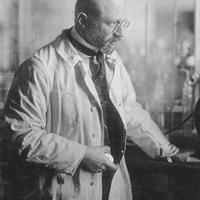
Jan 9, 2012
How do you square the idea of a bad person who does great good? Or a good person who does terrible harm? Sam Kean introduces us to the confusing life story of Fritz Haber. Around 1900, Haber was a young chemist in Germany, intent on solving the biggest problem facing his country: how to feed a growing population. At the time, everyone was starting to worry that we'd maxed out how much food the Earth could produce. But as Latif Nasser, Daniel Charles, and Fred Kaufman explain, Haber was intent on finding a solution. So he started experimenting...and pretty soon, he made arguably the most significant scientific break through in human history--he figured out a way to pull nitrogen out of the atmosphere, to make bread from the air, and feed the world. His discovery earned him a Nobel Prize. Around the same time, US officials were calling him a war criminal. Fritz Stern, a historian (and Fritz Haber's god son), tells us about the dark side of Haber's legacy, and helps us wrestle with how to take the measure of a man who both saved and destroyed an enormous number of lives.
READ MORE:
Daniel Charles, Master Mind : The Rise and Fall of Fritz Haber, the Nobel Laureate Who Launched the Age of Chemical Warfare
Fritz Stern, Five Germanys I Have Known
Adam Hochschild, To End All Wars: A Story of Loyalty and Rebellion, 1914-1918